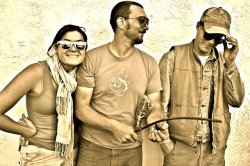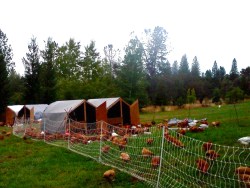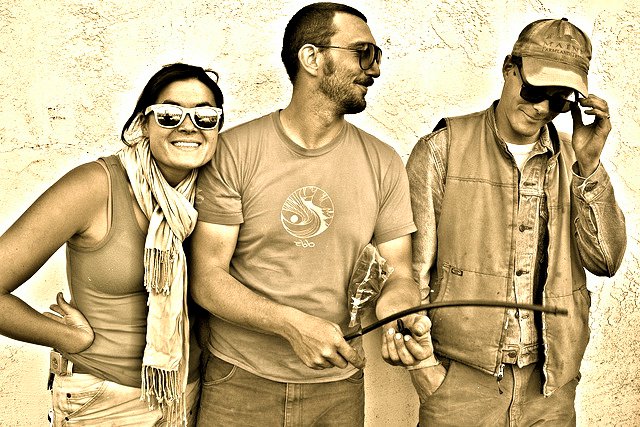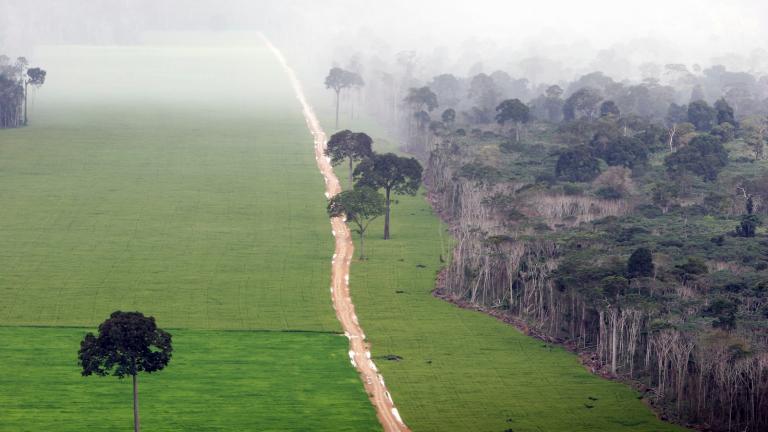
Molly Nakahara, Paul Glowaski, and Cooper Funk. In many ways, starting a farm is like starting a band, Glowaski says. (Photo by Alix Blair.)
Like many Americans, Paul Glowaski, Molly Nakahara, and Cooper Funk have farming in their families. Nakahara’s great-grandparents, Japanese immigrants, farmed in California’s Salinas Valley until being sent to internment camps during World War II. Funk’s extended family has a 2,000-acre farm in the Central Valley. And Glowaski’s grandfather farmed in Indiana. “He raised corn in the ’70s and ’80s, and they would stir the pesticide with their hands,” Glowaski says. “He died of pancreatic cancer, and probably lots of other farmers did too.”
With these stark pieces of farming history in mind, the three friends started Dinner Bell Farm, a place where, Glowaski says, “everyone is treated humanely, from the animals to the plants to the people.” The farm specializes in organic, pasture-raised heritage poultry, but also offers peppers, greens, okra, strawberries, and wedding flowers, and they’ve started raising sheep and hogs, too.
“We’re trying to create a real dynamic, diversified system, where the animals are working in conjunction with our vegetables, fruit, and flowers,” Glowaski says.
The 33-year-old Glowaski met Nakahara, 32, and Funk, 33, in the agroecology program at the University of California-Santa Cruz — one of the preeminent places to study organic farming in the nation. Realizing they had similar long-term goals, they began plans for what they called “Dream Farm,” a working farm that would not only feed people, but also provide education and training. They searched for land while working day jobs — Funk as a carpenter, Nakahara running a high school garden, and Glowaski at the Homeless Garden Project in Santa Cruz.
Nakahara’s family owned 10 acres of land in the foothills of California’s Sierra Nevada, and a few of their neighbors had adjacent property that had fallen out of use. The trio pieced together 40 acres, leased from five different landowners, including an orchard where their chickens have been roaming in the shade this hot summer. While the topsoil and terrain aren’t ideal, the availability of water at the site — something other areas they’d considered lacked — clinched the deal. So, in 2010, they started building Dinner Bell Farm.
Although Dinner Bell is a work in progress, it’s also the kind of farm that has the potential to anchor healthy local food systems at a time when the American farmer is aging, healthy farmland is disappearing, and Big Ag wields considerable political power. Some might dismiss the growth of this movement as a passing trend — back-to-the-land hipsters catering to elite urban foodies — but the passion of farmers like Glowaski, Nakahara, and Funk in the face of a food system designed, in many ways, to make them fail, suggests otherwise.
In the two years it’s been up and running, the farm has begun making a name for itself with its Naked Neck and New Hampshire chickens, heritage birds raised on organic feed and rotated heavily. Dinner Bell Farms supplies restaurants, caterers, and butchers, and the chickens are also available at local farmers markets and pickup sites in the Bay Area. At $22 for a medium bird and $27 for a large (about $5.40 to $7.50 per pound), they’re reasonably priced for such rare breeds, which grow more slowly and produce more dark meat than your typical Cornish cross chicken. “It’s a shame that all chicken is called chicken,” Glowaski says. “It’s like apples and oranges.”
Dinner Bell Farm’s commitment to organic feed has been challenged this summer, as the Midwest drought drives up the cost of grain everywhere. Glowaski says they’ve spent $15,000 more on feed this year than they would have two years ago, had they been farming at the same scale then. “That’s going to force us to change,” he says. Other idealistic producers have already succumbed to those forces: Soul Food Farm, another chicken provider well-known in the Bay Area, folded recently — even after trying to cut costs by making the tough choice to use conventional feed in order to raise the birds on pasture.
Instead of giving up on organic feed, Dinner Ball Farm is diversifying its operations; they’ve recently started raising hogs and sheep and improving their row cropping. Making their food affordable is important to Glowaski and his fellow farmers — “We don’t want to just feed the 1%,” he says — but that requires time to scale up. “The struggle for us will be the question: ‘How small is big enough?’ We don’t want to be huge, but we also want to make a living and have a salary and health insurance.”
 That’s why, by necessity, this type of farming can’t be a short-lived trend — farmers have to be in it for the long haul to have any hope of turning a profit, especially if they want to provide high-quality food at a reasonable price. The Dinner Bell farmers realize this; Glowaski says part of the process of getting started has been “accepting that this is a 10-year deal until it becomes even close to what you want it to be.” That means putting plans for the education component of the farm on hold until they’ve established a sustainable business model.
That’s why, by necessity, this type of farming can’t be a short-lived trend — farmers have to be in it for the long haul to have any hope of turning a profit, especially if they want to provide high-quality food at a reasonable price. The Dinner Bell farmers realize this; Glowaski says part of the process of getting started has been “accepting that this is a 10-year deal until it becomes even close to what you want it to be.” That means putting plans for the education component of the farm on hold until they’ve established a sustainable business model.
“I talk to our friends who are starting restaurants or trying to be in a band, and in many ways it’s similar — you invest everything you have because you believe that it’s something unique,” Glowaski says. “There’s this sea of other farms doing amazing things, but we’re just trying to eke out a little place that allows Dinner Bell, what we believe, to exist.”
In some ways, younger farmers are an anomaly in a generation known for its aimlessness. While other millennials and young Gen X-ers cycle through low-paying jobs and unemployment, scraping together rent for studio apartments in pursuit of the new urban American dream, aspiring farmers are leaving cities behind for work that can be grueling and lonely and difficult to just abandon if things don’t go according to plan.
“Farming can be so myopic and insular; there’s a lot of time alone,” Glowaski says. “There’s a lot of those days where — it’s so cliché — but the rooster’s crowing and it’s dawn and you put on your clothes and go out and start working and you work ’til dark. And you’re like, ‘Oh my God, what am I doing? This is insane.’”
Glowaski and friends started their farm with a lot of education, training, and preparation, but unexpected things happen every day — equipment breaks and deer destroy crops. Having mentors with years of practical experience is important, as is keeping on good terms with landowners, government agents, chefs, and other customers. “So much of our work is based on building relationships with people,” Glowaski says. “We’ve found this amazing community up here, and we’re starting to make friends.” The landowners, he adds, have been gratified to see the trio of farmers make an impact on the land they’ve invested in. “All the families are real stoked on what’s happening.”
You could say that focus on relationship-building is another thing that sets new farmers apart from their counterparts in cities, where neighbors can live cheek-by-jowl and not know each other. Farmers may spend a lot of time alone, but maybe it’s the city folks who are the loneliest.
And while those unexpected moments can be frustrating, there are positive surprises, too, that remind Glowaski of why he’s doing this work. “Some days are a real grind and it can be demoralizing. Some days are really inspiring. And you’re up so long during the day that you might have a few of those moments in one day,” he says. “It keeps you on your toes.”




